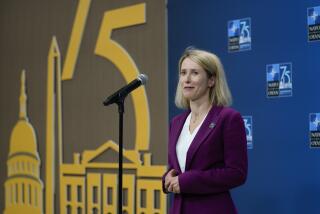Austerity plan key to Greece bailout
Greece will be forced to implement a painful package of tax increases and deep spending cuts if it wants other European Union members to bail out its sinking economy.
European leaders agreed in principle Friday to a new package of loans to Athens, on the condition that Greece approve the austerity package next week.
Greeks were warned that they would have to swallow the deeply unpopular measures to save their country from default and possibly bankruptcy.
Day two of a European Union summit in Brussels was dominated by the Greek debt crisis, which threatens the stability of the 17-nation Eurozone.
Greek Prime Minister George Papandreou said he was confident that his government would win the vote despite widespread labor strikes and threats from the conservative opposition to vote against the austerity measures.
“It is a moment of historic importance. If everybody resists, worse things will come, perhaps even bankruptcy,” Papandreou said at a news conference.
German Chancellor Angela Merkel said it was “highly desirable for the opposition to vote for this package.” She called on the Greek opposition to “fulfill its historic responsibilities.”
Greece was given $146 billion in European Union and International Monetary Fund loans in May 2010, but now needs a second large bailout. In return, international lenders, frustrated by Athens’ failure to rein in spending, want firm commitments that the country’s finances will be put in order.
In a statement, European leaders reiterated their commitment to “do whatever is necessary” to ensure the financial stability of the Eurozone and welcomed the Greek government’s commitment to implement the “adjustment program,” the official euphemism for the austerity package.
European leaders said they were “conscious of the efforts that the adjustment measures entail for Greek citizens, and are convinced that these sacrifices are indispensable.” The Eurozone plans to raise government and private funding for Greece.
In separate talks, European leaders elected Mario Draghi of Italy as president of the European Central Bank, but only after a spat between France and Italy was resolved; President Nicolas Sarkozy of France refused to approve of Draghi until an Italian member of the bank’s executive board agreed to be replaced by a French representative.
The summit also gave the go-ahead for Croatia to join the European Union in 2013 and for the potential reviving of border checks in the 25-nation, passport-free Schengen zone to thwart illegal immigrants fleeing unrest in North Africa.
Willsher is a special correspondent.
More to Read
Sign up for Essential California
The most important California stories and recommendations in your inbox every morning.
You may occasionally receive promotional content from the Los Angeles Times.










